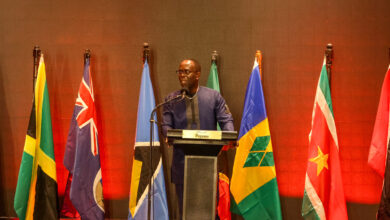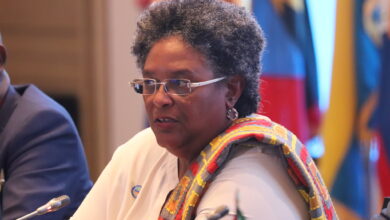The Caribbean Examinations Council (CXC) has announced that it will be introducing electronic testing (e-testing) in January 2017 beginning with Caribbean Secondary Education Certification (CSEC) multiple choice (Paper 01) exams only. Then, by January 2018 cycle, all CXC examinations will be available electronically in all territories offering the exams.
E-testing will allow students to take their CXC exams on a computer or electronic device.
In a release the Council said the “exciting” new initiative is in accordance with CXC’s pledge to adhere to global quality standards in the delivery of examination services and to improve experiences for students through the steady use of technology.
It noted that e-testing “will bring regional learners up to speed with worldwide test-taking practices and provide them with the flexibility to interact with images, video, audio and other resources during their examinations”.
Acting Chief Education Officer Lyneth Monteith was asked how large numbers of students in Cayman would access enough devices to do the exams and how often schools have cases of these large numbers taking their exams at the same time.
She answered, “In terms of our response to the proposed electronic testing discussions are ongoing with regards to infrastructure implications. The necessary adjustments will be made.”
The Cayman Reporter asked the Council to explain how exactly e-testing will be used for exams that require students to show the step by step process of how they arrived at their answers such as CSEC Mathematics Paper 2. In these examinations students are given additional marks for showing how they arrived at their answers.
Cleveland Sam, Assistant Registrar – Public Information and Customer Services at CXC, explained.
He said, “E-testing provides exceptional tools such as math editors that will allow the candidate to show the step by step process of how they have arrived at their answers. A math editor basically is a pop-up chart of numbers and symbols that can be used just as you would use pencil and paper to work out your answer.”
The Council stated that the e-testing format will adhere to world-class security standards which will guarantee the integrity of the test taking.
But when asked to expound on some of these security standards, Mr Sam expressed that “CXC is not at liberty to discuss details of its security posture as it relates to e-testing.”
“However, all of our testing procedures have and will continue to undergo independent assessment at varying intervals to assure that our systems and procedures meet the highest standards that currently exist. Examinations in the foreseeable future will be fully proctored both electronically and physically by the continued use of invigilators,” he added.
Earlier this year the Council mentioned it would pilot its electronic testing platform during the week of 25 April 2016 stating that it is “an excellent opportunity for candidates who are registered for the May/June 2016 CSEC and Caribbean Advanced Proficiency Examination (CAPE) to practice ahead of their exams”.
Mr Sam confirmed that the pre-test was conducted during the assigned week with a total of 14,000 candidates who registered for the pilot.
He stated, “The tests were implemented successfully across all territories and while we experienced some glitches due to technology and infrastructural issues, overall we are extremely satisfied that the pilot provided us with solid feedback and the learning experience of delivering examinations across 19 territories was indeed valuable.”
He confirmed that more practice e-tests are to be expected in October and December as the Council tries to get candidates and centres familiarised with this new platform.
“This is to ensure that candidates and teachers are familiar with the proposed environment and allow them to experience on-screen delivery of exams. Our plan will seek to expose participants to all question types, namely multiple choice, essay and similar type questions. Integrated within these question types will be some unique questions of an interactive nature that lend themselves to an e-testing environment,” said Mr Sam.
The format of the practice examinations are multiple choice for all Paper 01, and structured/short answer questions for Paper 2s and 3/2s for Cape Units 1 and 2 – Applied Mathematics and Geography.
The electronic pre-tested CSEC subjects include Additional Mathematics, Information Technology, Principles of Accounts, Biology, Caribbean History, English A, Mathematics, Office Administration, and Religious Education. The CAPE subjects are Agricultural Science, Units 1 and 2; Communication Studies, Environmental Science Units 1 and 2; Applied Mathematics Units 1 and 2; and Structured Papers 2 and 3/2; Digital Media Units 1 and 2, Geography Units 1 andv2, Structured Papers 2 and 3/2; Caribbean Studies Unit 1;
Entrepreneurship Units 1 and 2, History Unit 1, Logistics and Supply Chain Units 1 Multiple Choice, and Tourism Units 1 and 2.
CXC offered its first examinations for the Caribbean Secondary Education Certificate® (CSEC®) in 1979 in five subjects. Subsequent to CSEC®, CXC has introduced a comprehensive suite of qualifications to meet the needs of the region: Caribbean Primary Exit Assessment™ (CPEA™), Caribbean Certificate of Secondary Level Competence® (CCSLC®), Caribbean Vocational Qualification (CVQ), Caribbean Advanced Proficiency Examination® (CAPE®) and the CXC® Associate Degree (CXC®-AD).






